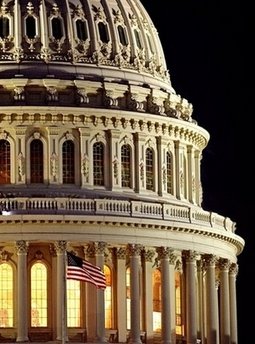
The US Capitol dome is seen in the early morning in Washington, DC. The US House of Representatives on Thursday agreed to hold a rare secret session, the first for a quarter century, on a wiretapping anti-terror bill, as a standoff with the White House deepened
WASHINGTON
House Democratic leaders agreed Thursday to a rare closed-door session — the first in 25 years — to debate surveillance legislation.
Republicans requested privacy for what they termed “an honest debate” on the new Democratic eavesdropping bill that is opposed by the White House and most Republicans in Congress.
The closed-door debate was scheduled for late Thursday night, after the House chamber could be cleared and swept by security personnel to make sure there are no listening devices.
The last private session in the House was in 1983 on U.S. support for paramilitary operations in Nicaragua. Only five closed sessions have taken place in the House since 1825.
President Bush vowed to veto the House Democrats’ version of the terrorist surveillance bill, saying it would undermine the nation’s security.
House leaders said they would vote on the bill Friday, just before taking a two-week recess. The bill would then have to be approved by the Senate.
Bush opposes it in part because it doesn’t provide full, retroactive legal protection to telecommunications companies that helped the government eavesdrop on their customers without court permission after the Sept. 11 terrorist attacks.
About 40 lawsuits have been filed against telecommunications companies by people and organizations alleging they violated wiretapping and privacy laws. The lawsuits have been combined and are pending before a single federal judge in California.
The Democrats’ measure would encourage the judge to review in private the secret government documents underpinning the program in order to decide whether the companies acted lawfully. If they did, the lawsuits would be dismissed.
The administration has prevented those documents from being revealed, even to a judge, by invoking the state secrets privilege. That puts the companies in a bind because it puts off limits evidence they might use to defend themselves.
It wasn’t clear what information would be presented in the closed session. Just a fraction of Congress has been allowed to read secret documents underpinning the surveillance program, and those who have arrived at varying conclusions.
The Senate Intelligence Committee, after seeing classified material, said the companies acted on the good-faith belief that the wiretaps they allowed were lawful. Democrats on the House Judiciary and Intelligence Committees were unconvinced after being presented with the same material.
Rhode Island Democrat Sen. Sheldon Whitehouse sits on both the Senate Intelligence and Judiciary committees. He said the documents lay out the Bush administration’s rationale for why it was legal to sidestep a special secret court that normally authorizes wiretaps. Congress created the Foreign Intelligence Surveillance Court in 1978 to prevent government abuse of wiretapping.
Whitehouse said the documents assert that the president has the power to determine what his constitutional powers are, particularly in a time of war.
The surveillance law is intended to help in the pursuit of suspected terrorists by making it easier to eavesdrop on foreign phone calls and e-mails that pass through the United States. A temporary law expired Feb. 16 before Congress was able to produce a replacement bill. Bush opposed an extension of the temporary law as a tactic to pressure Congress into accepting the Senate version of the surveillance legislation. The Senate’s bill provides retroactive legal immunity for the telecommunications companies.
Bush said lawsuits against telecom companies would lead to the disclosure of state secrets. Further, he said lawsuits would undermine the willingness of the private sector to cooperate with the government in trying to track down terrorists.
Michigan Rep. Peter Hoekstra, the top Republican on the House Intelligence Committee, said intelligence is already being lost.
“Each and every day our capabilities are eroding,” he said.
Directing his message at the House, Bush said, “They should not leave for their Easter recess without getting the Senate bill to my desk.”
Bush predicted the Senate would not pass the House version of the bill, and said even if it did, he would veto it.
At least one Senate Republican said the lawsuits should go forward to determine whether the wiretapping program was illegal. But Pennsylvania Sen. Arlen Specter wants to substitute the government for the phone companies as the defendant in the court cases.
“The president can’t have a blank check,” Specter said in an interview. “If you close down the courts, there’s no check and balance.”
He added: “Wiretaps are important for national security. There’s no doubt about that. Al-Qaida and terrorism continue to be a major threat to this country. It is my hope that the president will not find it necessary to veto the bill, that we’ll be able to work it out.”
House Majority Leader Steny Hoyer said Bush is misrepresenting the House bill, and suggested the fight is less about surveillance powers than it is that House Democrats are refusing to bend to Bush’s wishes.
“Congress owes the American people more than blind obeisance to the executive branch,” said Hoyer, D-Md.

Wild Thing’s comment……..
It’s a secret so I will whisper…..shhhhhh
LOL Wait a second. They had the place swept so no one could eavesdrop on their discussion of eavesdropping? Too funny. The word ironic comes to mind.

Bush backed Arlen Specter in a primary against a very conservative opponent. Specter has been paying Bush back at every opportunity by ambushing him on almost all critical legislation. Specter is the definition of RINO.
We are in a state of war. There should be no question about using wiretapping to get info on enemies.
Tom is right, Specter was chosen over many conservative objections and all our apprehensions about that worm have been proven. Secret session, that’s righteous, they couldn’t hold a secret in the house anymore than a sieve can hold water, there are too many of Bernie’s bandits in there piping the procedings to both the media and the direct enemy.
We can’t say we weren’t forwarned. The three presidential candidates all show the classic tyrant personalities.
The closed door and the sealed lips are prerequisites to tyranny.
–Frank L. Stanton
Tom your so right about Specter, he is a full blown rino. I agree too there is no reason on this earth that there should be a single question about using wiretapping on our enemies. I heard Dick Cheney speak on one of Rush’s shows and he said that the wiretapping has helped tremendously and most of it he could not even share of course on Rush’s show but wanted to come on and say how it has saved American lives being able to do wiretapping.
Jack….”Secret session, that’s righteous”….good one, it sure is, your right too we have been forwarned.
Gotta love JFK’s SUPER BULLET advocate: Arlen Specter! “The French are governed by prostitutes…” (Mark Twain) … I see our pimps & prostitutes for power have booked already for EASTER recess, eh?
Darth, yes they love making sure they get thier holiday’s in .